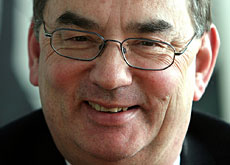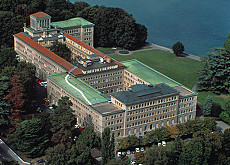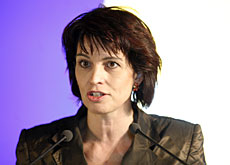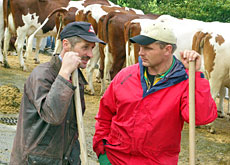Switzerland wants corrections in WTO talks

The Swiss ambassador to the World Trade Organization (WTO), Luzius Wasescha, says Switzerland must fight for corrections at trade liberalisation talks in Geneva.
Wasescha said despite progress in negotiations on agriculture and industrial goods, Switzerland would push for changes in September.
“We now have a solid working basis but I doubt that things can progress very quickly,” he told the Swiss news agency.
Wasescha said compromise proposals put forward last week by the New Zealand ambassador, Crawford Falconer, and the Canadian representative Donald Stephenson had laid a good foundation to continue the negotiations.
Falconer (agriculture) and Stephenson (industrial goods) chair two working groups at the WTO.
“It’s a positive sign. These two projects are too good to be turned down but at the same time too bad to be accepted,” Wasescha said.
Many problems
“There are still many problems from Switzerland’s point of view and that of the G10 [group of net food importers]. When we meet again on September 3, we will fight to make adjustments.”
For the time being “the pill would be difficult to swallow” for Switzerland and he criticised several parts of the compromise plan on agriculture.
The plan foresees that industrial countries reduce the highest customs duties on agricultural products by between 65 and 75 per cent, a percentage that Switzerland considers too high.
“This would be a shock for Switzerland, which would have to reduce 44 per cent of duties,” Wasescha said.
Switzerland also regrets the lack of commitment on the extension of protection of geographical indications.
Industrial goods
The ambassador also described the proposed customs duties reductions on industrial goods as “very modest”.
“Some developing countries want everything when it comes to agriculture without giving a thing when it comes to industrial goods,” Wasescha said in a hint at the position of the Group of 20 countries led by Brazil.
The G20 is the group of developing countries with special interest in agriculture.
Wasescha also said “the United States wants to give very little and obtain the maximum”.
The ambassador is hopeful that the Doha Round, which was launched in 2001, can be concluded by the end of the year or at the beginning of 2008.
But he says there is a question mark because on other issues, including services, he sees “nothing tangible”.
Diplomats feel that the WTO negotiations could speed up in September and an accord on procedures could be signed in October, before member states finalise their commitments by spring 2008.
After then it is felt that the presidential election campaign in the United States will prevent any US commitment.
Several meetings are to take place in Geneva before Friday when the WTO will take its summer break.
swissinfo with agencies
The WTO was formed in January 1995 from the General Agreement on Tariffs and Trade (GATT).
It has 150 member states.
Its budget for 2007 is SFr182 million ($149.84 million).
Launched in the Qatari capital in November 2001, the WTO’s latest liberalisation talks known as the Doha Round have struggled to overcome many countries’ fears of exposing sensitive agricultural and manufacturing industries to more competition.
The negotiations broke down in July 2006 and have failed to gather much momentum since.
Trade diplomats pledged on Tuesday to make another push for a deal to open world farm markets, calling proposals meant to break a deadlock “a good starting point” for negotiations resuming in September.
On July 13, Switzerland said it would donate SFr200,000 ($164,656.8) to the WTO Trade Facilitation Needs Assessment trust fund.
The donation will finance technical assistance programmes to assess developing and least-developed countries trade facilitation needs and priorities.
Trade facilitation looks at how procedures and controls governing the movement of goods across national borders can be improved to reduce costs and burdens. It also allows trade flows to be as efficient as possible.

In compliance with the JTI standards
More: SWI swissinfo.ch certified by the Journalism Trust Initiative



You can find an overview of ongoing debates with our journalists here. Please join us!
If you want to start a conversation about a topic raised in this article or want to report factual errors, email us at english@swissinfo.ch.